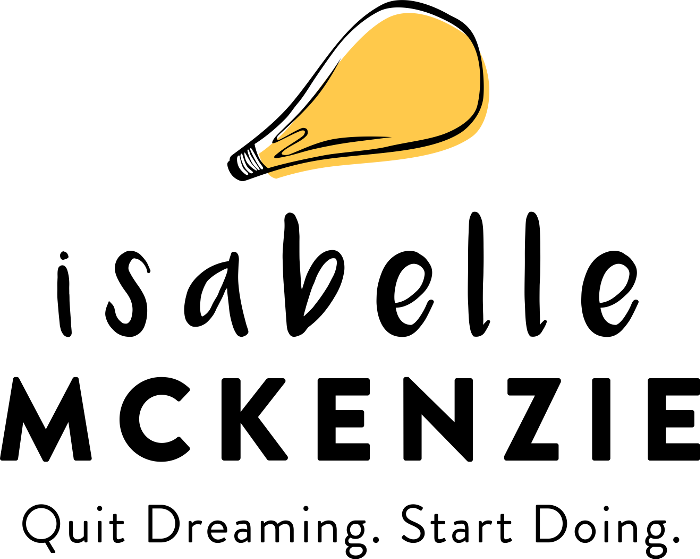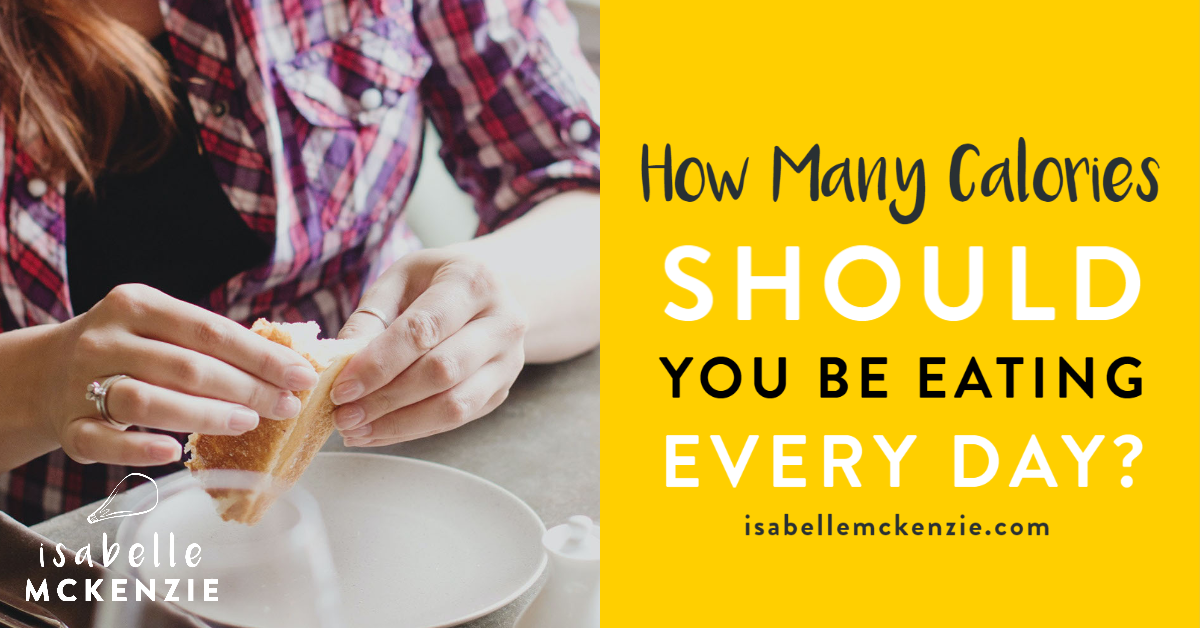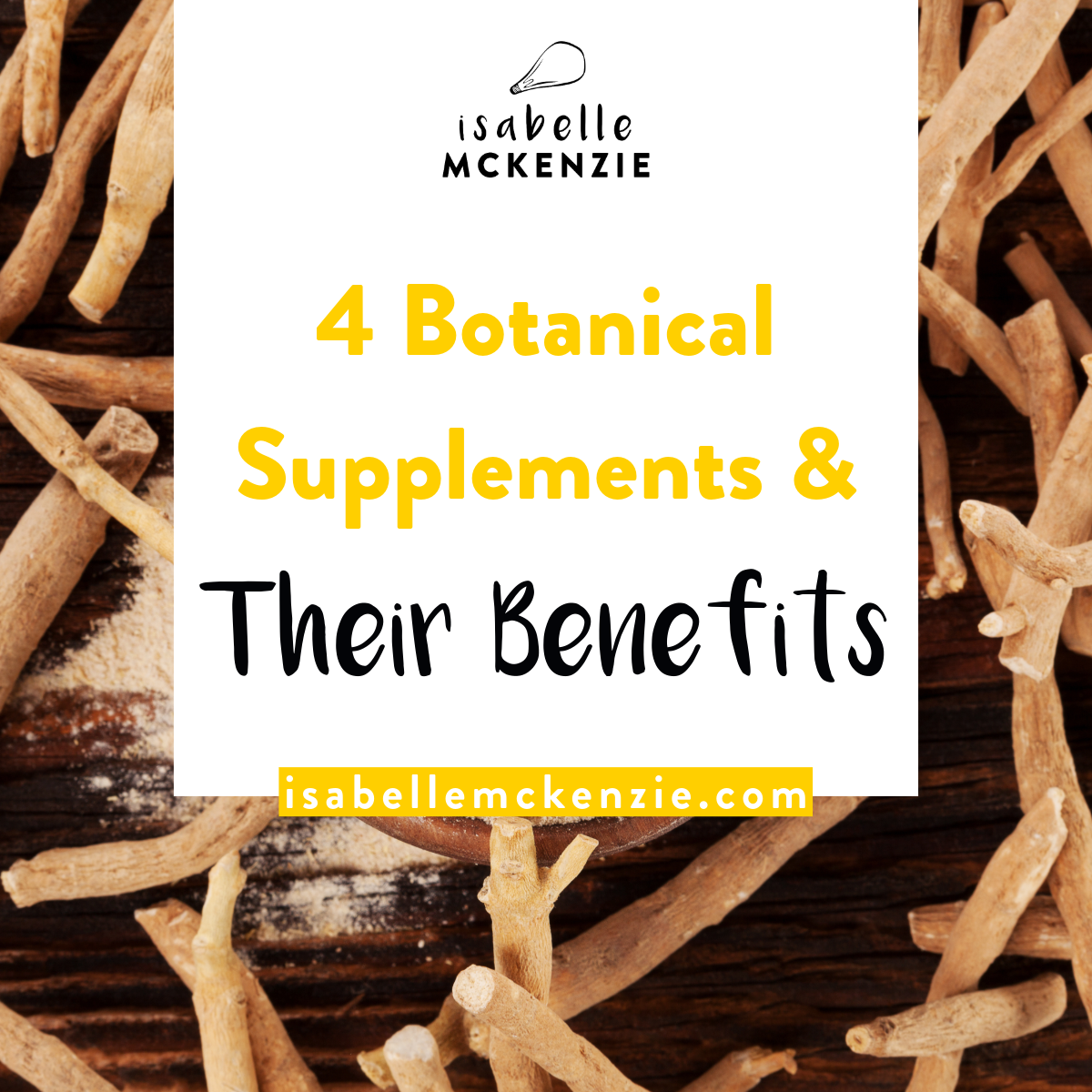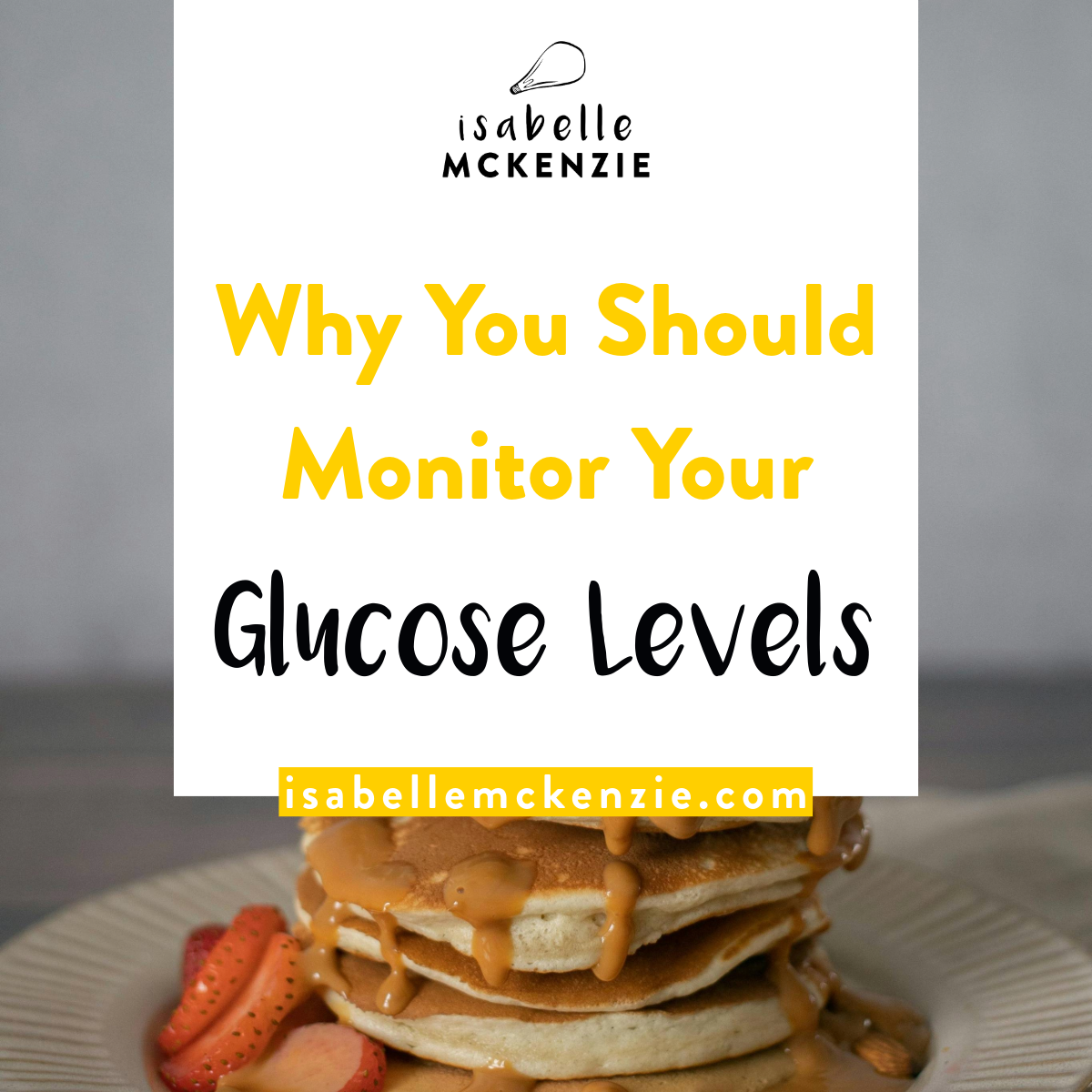How Many Calories Should You Really Be Eating Every Single Day?
#SugarBalancedLiving
Calories are something we’ve all had to deal with at some point or another - whether our goal is to gain, maintain, or lose weight. But the question of how many calories we should actually be eating is a tricky one, especially when we’re given generalized statements like "The average woman needs about 2,000 calories per day to maintain her weight, and 1,200 calories per day to lose weight. And, the average man needs 2,500 calories to maintain, and 2,000 to lose weight". But is this even true? And how many calories should you be eating every day? Let’s find out!
Why Calorie Counting Doesn’t Work
Now I don’t want to sound ‘judgy’ when I say this, because the amount of calories you eat in a day can sneak up on you (like during midnight Netflix snacking) so yes, it’s important to have a good general basis on your overall calorie intake to week to avoid over-consumption. But the troubling fact is, the food restriction model and the endless pushing of the “low-calorie” myth is ridiculous.
We all know that classic and even regularly occurring scenario of yo-yo dieting: deciding to “lose weight” or fixating on maintaining weight, clearing out the so called high calorie bad foods from the kitchen, hitting the gym, and then the fixation over your calorie intake starts to take hold, so much so that sometimes you don’t even max out over 1000 calories per day.
And sadly, all of this eventually leads to a massive crash of binge eating habits, only to start the whole process over again later!
I’ve been there so many times, I can’t even count. Like many women (& men) I grew up with extreme self-confidence issues, with the mindset that being super thin was the only way to be worthy in society. I felt like I needed to be ‘skinny’, no matter how I got there.
All I did was end up totally and endlessly obsessing over food, to the point where I was under-nourishing my body with foods that weren’t even nutritional, just because it was low-calorie. This is why I would always feel hungry, dream about cheating my diet, left bloated, inflamed, and unhealthy, which didn’t feel like a problem at the time because I thought I was doing everything right, eating 1200 calories a day, actually many times even below that.
While it's a common ‘fact’ that the less you eat, the thinner you become, the healthier you are, the easier it is to maintain being ‘thin’, this isn't always the case.
If you starve your body, it prompts your body to hold onto its fat cells and halts muscle growth, as your brain begins to believe it’s preparing for famine.
Calories in and calories out is not a good way of thinking. Calories aren’t the enemy, they’re here as a guidance tracker for your diet.
Your calorie needs and how many calories you should eat will vary per person and depend on a numerous amount of factors, like your age, height, weight, and activity levels (basically whether you're a gym bunny or daytime TV buff).
So, with all this said, today I’m going to help you bust some myths based around calories, help guide you to understand where you can find the optimal sources of calories for your health goals and finally get to the answer behind how many calories you should really be eating every day!
While having awareness over a calorie intake is an effective tool to help you along on a health journey, there is so much more to it than simply calories in calories out.
What Exactly Is a Calorie?
Calories are fuel for our body and are critical in our ability to function. A calorie is a unit of energy. Nutritionally, all types of food — fats, proteins, carbohydrates, or sugars — are important sources of calories, which we need to live and function.
Imagine that you’re measuring an inch of space in your house, a calorie is a unit of measurement.
Technically a calorie is a way to measure the energy in food. Everything you eat or drink has a calorie count, whether it’s big or micro-small, and while in technical terms the more calories a food has, the more energy your body has to function, a proper calorie count takes into account the type and amount of what it is you’re consuming.
What Is a High-Calorie Food?
Foods that are considered high-calorie or fairly calorie-dense, are foods and drinks that cause you to easily obtain a high amount of carbs and calories relative to their serving size. Fats like oils, butter, fried foods, and sugary sweets are all high-calorie foods. But while high-calorie foods are often associated with junk food, some can be essential nutrients as well.
For example, I’m a strong believer in good fats and bad fats.
While the food industry intentionally went out to vilify fats to take the heat off the damage caused by their money-making sugar-based products, dietary good fats are essential to give your body energy and to support cell growth.
They also help protect your organs and help keep your body warm. Fats help your body absorb some nutrients and produce important hormones, too.
In actual fact - healthy fats are fantastic for you (olive oil, coconut oil, avocados, 70% or more dark chocolate), and your best, and I mean your best, friends in your journey to combating hunger and cravings.
What Are Low-Calorie Foods?
Low-calorie foods are foods that have a low amount of calories relative to their serving size. Fruits and especially vegetables are usually relatively low in calories. Healthy low-calorie foods include water, tea, salad greens, soup broth, mushrooms, strawberries, vegetable soup, whole grain toast, cod, eggs, and low-fat cottage cheese.
But I must share with you that low-calorie doesn’t always mean healthy or good - calories aren’t everything.
For example, a tbsp. of extra virgin olive oil is loaded with calories, but it’s incredibly healthy and essential.
And now for example, you have a can of sweetened soda or some fruit for the same amount of calories, but one will lead to fat gain.
Look at the soda - that’s going to be 140 calories of sugar and literally nothing else (well, maybe some harmful chemicals).
Now let’s say you have one apple and one pear.
That’s 190 calories combined, but these fruits aren’t just sugar and nothing - they’re providing you with vitamins and minerals like fiber and potassium, and are packed with immune system boosting antioxidants.
This means all the sugar from the soda will go straight to spiking your blood sugar levels and can very well lead to weight gain, while the fiber and minerals will protect you from the fruit’s sugars and increase your body’s amount of important nutrients.
See, what I mean? Calories in and calories out is a very flawed method.
And then there’s synthetic low calorie foods.
Take for example zero-calorie and low-calorie foods which are not all they’re cracked up to be.
Most foods and drinks like diet coke, zero-calorie salad dressings, low-calorie frozen yogurt, sugar-free candy and low-fat or fat-free everything these days, contain weird syrups like corn syrup (an insulin wrecking form of SUGAR, that can seem lower in calories, but is terrible for your body), hydrogenated oil like palm oil (a cholesterol destroying... form of FAT!!!) and natural and artificial flavors, made from chemicals and artificial sweeteners that mess with your body’s chemical messengers, causing cravings, hormonal imbalance and can trick your body into weight gain.
Also, food labels are not telling the whole story. Labeling is designed for tricking the consumer into thinking something is low-calorie, fat-free, and/or sugar-free.
A label may read only 30 calories, leading you to be of the mindset that it is insignificant and to eat or drink more of it, but it’s actually 30 calories per serving size and they usually make the serving size as small as possible. For example, no one’s going to only drink 1/4 cup of the soda or 1 tsp of the coffee creamer.
What Are Empty Calories?
Empty calories contain few to no nutrients. They often come from added sugars, solid fats, or are processed into empty calories like in refined carbs. Put simply, most empty calorie foods will be highly processed and/or contain added fat and sugars.
Many popular food choices have a lot of empty calories are ice cream, sodas, synthetic cheese, pizza, cakes, biscuits, pies, pastries, shop-bought desserts, sweetened fruit drinks, and processed meats. Some of these foods may occasionally contain some nutrients.
Take for example pizza. If made from pure sources, the cheese and sauce may be high in calcium, vitamins and contain protein, but the crust is made from refined flour (as most are made from) which is an empty calorie and blood sugar level spiking nightmare. Of course, commercialized foods aren’t made from pure and natural ingredients, so empty calories all around.
Empty-calorie foods and drinks make up most long shelf life foods and drinks sold in snack sections and vending machines.
Alcoholic drinks such as beers, wines, and spirits will also contain high numbers of empty calories.
While these foods may seem tasty and readily available, as you may have guessed, these foods aren’t the best thing for your health. Not only are you consuming too much energy, causing fat storage, but processed junk foods and sugary food intake is the primary factor in causing not just obesity, but also abdominal fat, high blood pressure, high blood sugar, unhealthy cholesterol levels, chronic, lethal health issues, and is literally addictive.
Research as proven junk foods like white bread, cakes, cookies, and potato chips are addictive in the same way that heroin or cocaine is addictive.
Junk foods either raise your blood sugar levels like sugar or act like sugar in the liver, as this is toxic and triggers the same region in the brain that is ground zero for a drug abuse addiction. This is called sugar addiction and while unknown to many, it is shockingly common. Crazy right?!
If you want to learn more about sugar addiction and how to stop it click here.
So, What Should We Do About ‘Calories’
Now, we have a clear understanding of what a calorie is, what makes a calorie good or bad, (I know some of the facts stated here are scary, but we all should know the truth) we can now get to the answer of how many calories we need a day.
Unfortunately thought, here there is no simple answer.
That is an equation that is highly complicated and a variable dependent answer. Like I said earlier: it all depends on gender, age, activity level and type, and genetics or metabolism, and calorie counts are always an approximation.
Depending on what your health goal is - to lose weight, maintain your weight, or even gain weight depending on your health goals — calorie counting may be more important for that awareness of what it takes portion-wise to reach whatever your goal is.
If you eat more calories than you need in a day, based on your weight and activity level, you’ll gain weight. If you eat less calories than you need per day, you’ll lose weight.
But like I mentioned earlier when you under-eat like many people on the 1200 calories per day diet, for most, it may have negative effects. For example, this kind of eating has been shown to lead to: food cravings, moodiness, sleep issues, and hormonal problems. And while it is possible to lose weight at first, many can’t maintain it and if left on this kind of deficit for you long as I referred to earlier you may see an increase in weight gain.
If you’re looking to lose weight, a slight caloric deficit with the right dietary diet can lead to sustainable weight loss (more on that later) not under-eating.
Why Calorie Counting Is Effective?
To accurately count calories for weight loss, you would need to know your basal metabolic rate, aka how many calories your body burns each day simply to stay alive. Yes, apps can approximate the number of calories you use in a day, but you shouldn’t be letting some approximation app determine how much you should be eating?
And then there's the fact that you don’t know how many calories your body is absorbing from food. I kind of referred to this earlier when I mentioned the soda vs the fruit. Dietitians use to have the belief that since 3,500 calories equal a pound, whenever you would eat 3,500 extra calories on-top of what your body needs, you’ll gain that weight. But now we know better than to think like that. As I keep saying – not all calories are equal – calories in calories out is flawed.
There are many numerous variables to determine how many calories you’re absorbing - how processed is your food, how much does this food spike your blood sugar levels, how much fiber does this contain, etc.
And this kind of calorie counting also adds to the misconception that you can ‘burn off’ the food and drinks you consume. No matter what your calorie-counting app says, you can’t exercise off your eating transgressions. The human body doesn’t burn off food calorie-for-calorie.
How Many Calories Do You Really Need?
I know that we like rules and it’s heavily ingrained in our minds by the dieting industry that low-calorie is key. But its a flawed concept.
What you need to do is have the mindset of tweaking your diet to fit your own ‘specific’ body and situation.
Firstly, the younger and taller you are, the higher your basal metabolic rate. Men also tend to have a higher resting metabolism than women. But mainly it comes down to your level of physical activity, from day to day. The more active you are, the higher your energy needs.
However, don’t use the fact that you’re active as an excuse to binge eat, note that you need your energy from clean healthy sources, and remember too many calories aren't ideal, either. In addition to weight gain, consuming more calories than your body needs can result in a variety of negative ailments.
The perfect balance of calories will complement both your metabolic rate as well as your physical activity level.
If You Want to Lose Weight
If your goal is to lose weight – a slight caloric deficit and good nutrition overall can lead to sustainable weight loss (assuming that you’re not already under-eating, reducing your normal intake by 300-500 calories). If you’re semi-regularly or generally active, don’t go above and/or stay at around 1800 calories per day and if you are extremely sedentary and/or small, I recommend dropping this number.
A basic diet example (this isn’t exact) that is should be good for weight loss would be to aim to have three meals a day, each with:
1 serving of lean protein (like 30z of cooked chicken, 2 eggs or 1/2 block of tofu, etc)
0-1 serving of fiber-rich carbs (1-2 slices of sprouted grain bread, 1/4 cup of brown recipe or 1/2 cup of oatmeal, 1 cup of fruit, etc)
1-2 servings of healthy fats (like 1 tsp of olive oil, 1/4 of a whole avocado, 1/2 oz of nuts
and then have an unlimited amount of non-starchy veggies (like leafy greens, peppers, callower, etc.)
And note, while fruit is a healthy essential, it is still high in natural sugar, so keep your servings of it to 3 servings a day.
For people who aren’t at a healthy weight and struggle with health problems or who are over-weight, weight loss is necessary for optimal health. But for those of you whose weight loss efforts are for beauty standards set by society, you may find your body resisting weight loss attempts for a reason. In this case, listen to your body, and focus on weight maintenance and eating a clean diet. (continued below)
If You’re Looking for Weight Maintenance
If you’re focusing on maintaining a healthy weight, then there are a few things you need to note. Firstly, wellness doesn't discriminate!
Whether you’re thin or overweight, a healthy diet is crucial to living a vibrant life. Too often so many people believe that thin people can eat whatever they want and even may state that they can’t wait to be at their target weight so they can finally eat what they want - from desserts to many slices of white bread.
But, please, let’s wash away this belief, and remember that wellness is a practice. Even if you’re thin, you still shouldn't lead an unhealthy diet.
A University of Arizona study suggests that high-calorie junk and sugary foods could cause “metabolic dysregulation” such as high insulin levels or inflammation (even if you’re thin) and may even increase one’s risk of cancer.
When it comes to how many calories you should be eating, take your body weight and multiply it by 14 and 17.
Somewhere in between the answer is a rough estimate of your daily caloric needs. Stay on the lower side if you’re a less active person. Using these calories to eat a balanced diet full of lean protein, plenty of fibrous veggies and healthy fats with a moderated allowed treat food everyone once in a while is the best way to go for a happy, healthy, sugar balanced diet.
What to Remember!
Alright guys it looks like we’ve almost covered everything. Hopefully, by now you have a good idea of how to continue creating a well balanced and healthy lifestyle, with all health goals on the right track to succeed.
While calories do count, since they’re a guide on what you consume, counting calories can be a dangerous practice at worst and not completely accurate at best.
Remember it's not just the calories, but how much of the protein, carbohydrate, and fat and vitamins and minerals you take from the food that's important for overall well-being. Use calories for as a general guidance.
Sometimes high-calorie foods may be better for you than lower-calorie foods, especially healthy fatty foods like nuts, olive oil, avocado, fruits, and coconut oil, they may be high in calories, but they are full of nutrients that you need to stay at the peak of health.
Unlike foods like fried wings or chips - they may also pack on calories, but they’re empty calories and wreck your hormones.
And, also take for example Greek yogurt - it’s higher in calories than fat-free yogurt, but is healthier due to its healthy fats, natural probiotics, and pureness instead of most fat-free yogurts which are full of additives and sweeteners.
So, let’s now break away and shift our mindset from dieting industry propaganda “How many calories are in this?” to “Let me opt for pure whole foods like vegetables, fruits, lean protein, and moderately sized healthy fats and whole grains, and also take time to eat mindfully by slowing down and appreciating while I eat, allowing my body to tell me when I’m satisfied”.
Of course, again, I’m not all down on calories.
I’ll say it again, counting and cutting calories is a practical approach for guiding you to a balanced diet that’ll help you lose weight. However, do not fixate over numbers, do not undereat (follow my recommendation from above) and take a strong approach of focusing on changes in dietary behavior rather than calorie counts.
Find ways to not just slash calories but also replace them with healthier nutrient-dense options full of vitamins, minerals, and other nutrients you may have been missing out on, that are still emotionally gratifying for you to eat.
If you used to eat 400 calories worth of froyo after dinner, then change that out with frozen banana and cocoa powder blended into soft serve ‘nice cream’, cutting calories, changing it into something sugar-free, giving you the same sweetness but eating something with nutrients.
I’m not saying go overboard here, because of course, you need to keep your servings of fruit to 3-4 servings. So, just shift proportions of foods around to make them work for you.
Take your own specific personal calorie needs into account, let not just calories, but tracking portion sizes and how a food will serve your body and how it performs with adequate food, be your guidance. Focus on building a good plate!
No one diet is going to tell you how much you “should” be or “can” be eating, it can only shift you in the right direction, you’re unique and only you can answer that.
Now, before you go… I know it can be hard going wholesome and removing processed and synthetic packaged foods from your diet, especially when they cause you to endless crave them. So, if your weight has crept up on you and/or you’re tired feeling STUCK in trying to conquer negative food habits without food fads, obsessive dieting, deprivation, or the need for willpower, I have some extra support for you, that’ll help you in cutting down on processed foods and junk foods addictive pull!
Firstly, I have a Free Live Masterclass called 11 Most Common Mistakes to Avoid When Quitting Or Reducing Sugar In Your Diet (& How to Fix Them)!
I'll be teaching you how to escape the most common and overlooked mistakes made when working on cutting down on or quitting junk foods and sugary foods from your diet.
And since I’m totally here to help you the best I can… for even more effective and actionable support, I’ve put together some seriously useful and easy hacks on cutting back sugar and junk foods for good.
Check out my FREE ‘Ultimate Guide to Crushing Your Sugar Cravings’ Downloadable Guide.
Get started on effortlessly breaking your sugar reliance/addiction for good with help + support. AND, most importantly, while maintaining a healthy balance between your mind and your body - because low-sugar living shouldn’t feel like deprivation.
Plus, for even more support, to help guide apply what you’ve learned about food today during your next shopping trip, I’ve put together a whole list of everyday innocent-looking foods that are hiding a surprising amount of sugar, in my '27 Hidden Sugar Foods to Watch Out for Checklist + Guide.















… yup, the Isabelle behind the IsabelleMcKenzie.com!
Instagram: @ItsIsabelleM | Pinterest: @ItsIsabelleM | Subscribe on Youtube
I’m dedicated to helping teach people how to live their happiest, healthiest life and reach their goals so that they can create the lifestyle of their dreams with integrity & purpose.
I focus on self-care, mind, body and health, dedicated to helping teach peeps how to live their happiest, healthiest life and reach their goals so that they can create the life that will have them jumping out of their bed in the morning to actually live!
Read More >